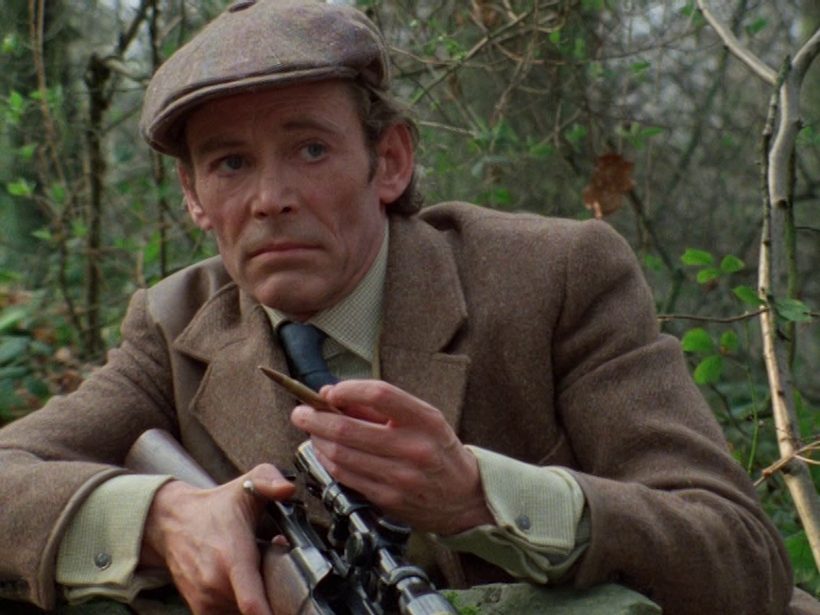Recent viewing (well, as recently as last year) has been the 1976 Rogue Male. I've praised Geoffrey Household's 1939 novel on here before, and so happily picked up a BFI DVD (a dedicated set of notes on which is here) when I saw it. Made for the BBC, directed by Clive Donner, script by Frederic Raphael (who also did script work on that seasonal favourite, Eyes Wide Shut).
Peter O'Toole plays the protagonist, unnamed - indeed, deliberately anonymous - in the original, but here given the name 'Sir Robert Hunter' allowing a normal flow of conversation; and for the credits to read 'HUNTER - Peter O'Toole'. Other characters played by Alastair Sims, John Standing, Michael Byrne and Harold Pinter (yes, that Harold Pinter).
Rogue Male had been adapted before - by Fritz Lang, no less - under the name Man Hunt in 1941. This had altered the story rather and bore the weight of anti-Nazi propaganda efforts in 1941.
Of course, Rogue Male is a suitable source for such a thing. The book features the nameless protagonist and narrator (an English aristocrat and hunter) taking aim at an unnamed dictator from a state that borders Poland. Well, Household was being relatively discreet in 1939, but the feel of the protagonist's torture, escape and pursuit through both the unnamed foreign power and Britain suggest Nazi Germany rather than the Soviet Union. Household would later confirm that he was thinking of Germany; to my mind the ambiguity of the framing narrative is part of the essence of the novel, but there is no real harm in knowing this. Naturally, the film would struggle to make an actor (and the set, and the costumes, and the spearcarriers....) look like either Hitler or Stalin. Maybe it could be done in some form of animation, but hardly live action.
 |
| Va tacito e nascosto, quand'avido è di preda, l'astuto cacciator! |
The narrator is caught and contends that he was only going to point his rifle at [Possibly Hitler]; it was a sporting stalk against the most dangerous game of all. Here is one of the major points of divergence between book and film: the text of the book has been written by the protagonist (even noting where he stopped work and started again). It takes time for him to admit - both to us, and seemingly, to himself, that he A) intended to kill [Possibly Hitler] and B) did it because of his love for a woman killed by the tyrannical regime.
Of course, this slow-maturing portion of the novel cannot be reproduced in the film. Flashbacks, imagined sequences and montage make Sir Robert's motivation fairly clear. Further, other characters know of his romance, originally oddly concealed in an otherwise somewhat well-known man.
Further, the film introduces Alastair Sim as a doddering Earl and government member to explain the delicate political situation of 1939 - things the book's protagonist could work out for himself. I can't find it in myself to complain about his presence, though the first name references to 'Neville' and 'Winston' are a bit much. Likewise, the plausibly Jewish lawyer of the book, Saul, is made definitely Jewish (Saul Abrahams, played by Harold Pinter). There is at least one piece of clearly framed British Union of Fascists graffiti shown on Sir Robert's return to London. The half-German adversary who uses the name 'Major Quive-Smith' is in the film no more than he appears - a Nazi sympathiser and English hunter, played by John Standing.
So, the 1976 film is less veiled than the book, and is made with a dollop of hindsight. But it still captures the mood well; even if we cannot get so much technical information about Sir Robert's burrow or the surrounding farms, or miss his musings on British society, the impressions of his efforts in concealment, or the nature of his interactions with wider society are adequate. If O'Toole and Sim are perhaps sometimes over-arch or stereotyped (an escape through London is probably more compelling if Sir Robert knows how to ride the Underground!), well, it's all very finely done. Even if the protagonist's injuries are downplayed - who wants to cover up any leading man's face, let alone Peter O'Toole's? - we get a very strong impression of what has been done to him and the problems this causes. It all looks very good, as well. Strong, well-placed actors and settings.
As ever, read the book first (or listen to the Michael Jayston reading). But I enjoyed this, certainly.
***
I'm not given to reviews of the year, but 2021 did see at least one watershed for this blog with the launch of Punth: A Primer - bolstered by some kind words and good publicity. TRoAPW is the next such item on the agenda, but is still half-formed. My review of Magical Industrial Revolution was popular, and I may have to do a little more review work.
In the meantime, enjoy the last days of Christmas and Epiphany, and let us see what 2022 brings.
[Postscript to say that this has got a lot of views for such a brief, commonplace post - perhaps more interesting is this other Rogue.]
I first discovered Rogue Male via the Michael Jayston reading on Radio 4 Extra, while I was buried depressed under my duvet for several days with only a small chimney to breathe through. The narrator's bolt-hole felt very familiar, and of course the film version could not match expectations, although I did rather enjoy the film.
ReplyDeleteI have the MP3s of both Rogue Male and Rogue Justice, if you're interested.
Did listen to Rogue Justice at some point. Never felt the need to revisit it.
DeleteI hope there wasn't a dead cat under your duvet.